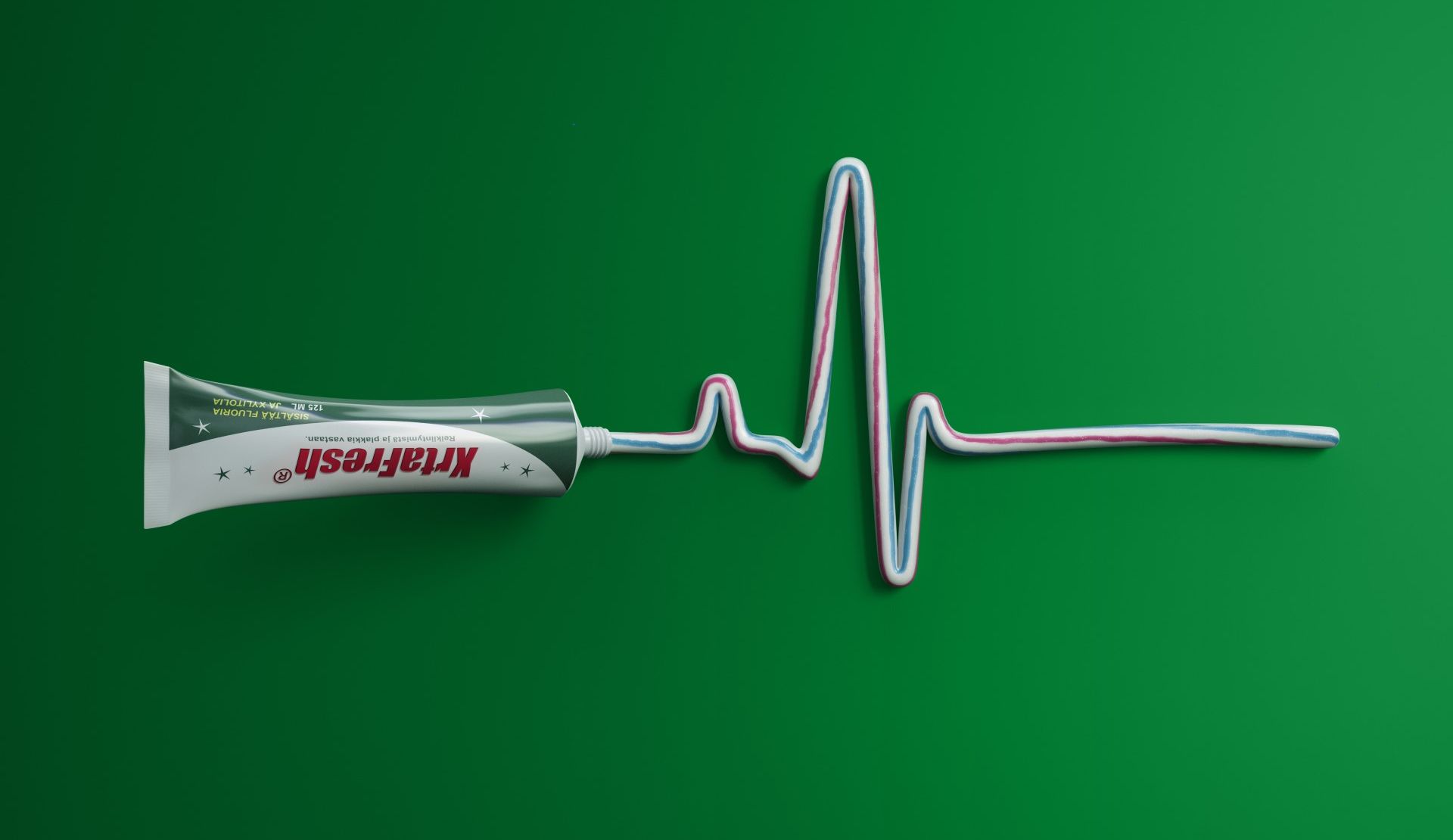
Tooth sensitivity - easy treatment for a common condition
Pay flexibly with various payment methods. Learn more about the different payment and financing services we offer and choose the one that suits you best.
Outpatient clinic fee of a visit to the dentist is 37,90 € and for a dental hygienist visit is 27,90 €.
As of March 15, 2023, the polyclinic fee does not have to be paid after more than five reception visits during the calendar year. After the fifth payment, the polyclinic fee is 0 € for visits for the rest of the calendar year.
The Kanta fee (4 €) will be charged for visits to Hammas Mehiläinen starting from January 1, 2026.
If you visit our clinic and do not pay for your appointment using the available payment methods, we will send you an invoice for your appointment. The invoicing fee is 5,20 €.
If the procedure is booked with a specialist dentist, the prices are increased by 30 %.
Check out Hammas Mehiläinen's flexible payment methods.
| Service | Price estimate |
|---|---|
| Dental check-up | 56,00 € Without Kela reimbursement 86,00 € |
| Dental check-up for patients with dental fear | 93,00 € Without Kela reimbursement 123,00 € |
| Children and young people dental check-up The dental check-up performed by a dental specialist. Book a dental check-up for children and young people Prices 81,00–121,00 €, without Kela reimbursement 111,00–160,00 € | 81,00 € Without Kela reimbursement 111,00 € |
| Dental X-ray of the teeth and jaws | Mobile Benefit 90,00 € The price with a doctor's referral after Kela compensation is 79 €. 110,00 € Without Kela reimbursement 120,00 € |
| Tartar removal 30–45 minute appointment with a dental hygienist. Book an appointment for tartar removal Explore different payment methods Prices 122,00–169,00 €, without Kela reimbursement 142,00–199,00 € | from 122,00 € Without Kela reimbursement from 142,00 € |
| Tooth jewellery application The price does not include the price of tooth jewellery. | from 69,00 € No Kela reimbursement |
| Dental fillings 1–3 surfaces. Prices 97,00–216,00 €, without Kela reimbursement 107,00–236,00 € | from 97,00 € Without Kela reimbursement from 107,00 € |
| Ceramic filling of the tooth 1–3 surfaces. Explore different payment methods Prices 287,00–589,00 €, without Kela reimbursement 287,00–629,00 € | from 287,00 € Without Kela reimbursement from 287,00 € |
| Dental ceramic crown Laboratory costs are not included in the price estimate. Explore different payment methods Prices 627,00–812,00 € | from 627,00 € No Kela reimbursement |
| Chipped tooth Prices 97,00–216,00 €, without Kela reimbursement 107,00–236,00 € | from 97,00 € Without Kela reimbursement from 107,00 € |
| Tooth extraction Explore different payment methods Prices 113,00–768,00 €, without Kela reimbursement 123,00–808,00 € | from 113,00 € Without Kela reimbursement from 123,00 € |
| Tooth whitening Price estimate given at the free consultation appointment. Book an appointment for a free whitening consultation. Prices incl. VAT Prices 102,00–461,00 € | from 102,00 € No Kela reimbursement |
| Whitening consultation appointment Includes an individual price estimate for teeth whitening. Book an appointment for a whitening consultation. | Free No Kela reimbursement |
| Anaesthesia | from 42,00 € Without Kela reimbursement from 42,00 € |
| Irrevocable absence Prices 75,00–98,00 € | 75,00 € No Kela reimbursement |
| Initial assessment of sleep apnea Learn more about sleep apnea and book an appointment (in Finnish) | from 155,00 € Without Kela reimbursement from 185,00 € |
| Bite guard Includes clinical work and the bite guard. Prices 648,00–692,00 €, without Kela reimbursement 708,00–752,00 € | 648,00 € Without Kela reimbursement 708,00 € |
Facts about sensitive teeth
- Tooth sensitivity refers to sharp and sudden pain in one or more teeth and can be caused, for example, by cold, hot or touching the tooth.
- A common cause of sensitive teeth is receding gums, usually caused by long-lasting gingivitis. Sensitivity may also be caused by strong brushing of teeth or gum recession resulting from the use of an orthodontic treatment appliance.
- The most simple treatment of sensitive teeth is to fill the cavity or prevent the cavity from progressing. Gum recession can be fixed surgically either by stretching the gum next to the tooth or by using tissue from the palate to cover the recession.
What causes tooth sensitivity?
Sensitive teeth can be very unpleasant and even painful. They can interfere with daily activities such as eating and drinking, and even prevent you from enjoying your favourite foods or drinks. Your dentist will help you identify the problem and give you the treatment you need to relieve pain and improve your overall oral health.
The most common reasons for tooth sensitivity are
- gum recession
- a dental cavity or chip in the tooth
- opening at the edge of the old filling
- tooth wear
A common cause of tooth sensitivity is gum recession. There are channels filled with liquid under the gums in the dentine which go deep inside the tooth. The liquid in these channels starts moving, such as when eating cold food, and the nerve cells of the tooth sense this as ache in the tooth. Tooth sensitivity may be caused by consuming hot, cold, sweet and acidic foods.
The most common cause for gum recession is advanced gingivitis. If you notice gingivitis symptoms, such as red or swollen gums or bleeding, you should book an appointment with a dentist. Sensitivity may also be caused by strong brushing of teeth or, for example, gum recession resulting from the use of an orthodontic treatment appliance.
Sensitivity experienced in a large area may also be related to tooth wear. Occlusion system disorders or frequent use of acidic products, such as juices or soft drinks, may also lead to sensitivity.
Treatment of tooth sensitivity
The most simple treatment of sensitive teeth is to fill the cavity or prevent the cavity from progressing. If the sensitivity is caused by a crack or chip in the tooth, the dentist can fix it with composite resin.
If the sensitivity is caused by gum recession originating from gingivitis, the gingivitis must be treated first. The brushing technique must also be checked: teeth should be brushed with short strokes using a soft toothbrush. The dentist can also treat the teeth with agents preventing sensitivity.
Gum recession can also be fixed surgically either by stretching the gum next to the tooth or using tissue from the palate to cover the recession.
Outpatient clinic fee of a visit to the dentist is 37,90 € and for a dental hygienist visit is 27,90 €.
As of March 15, 2023, the polyclinic fee does not have to be paid after more than five reception visits during the calendar year. After the fifth payment, the polyclinic fee is 0 € for visits for the rest of the calendar year.
The Kanta fee (4 €) will be charged for visits to Hammas Mehiläinen starting from January 1, 2026.
If you visit our clinic and do not pay for your appointment using the available payment methods, we will send you an invoice for your appointment. The invoicing fee is 5,20 €.
If the procedure is booked with a specialist dentist, the prices are increased by 30 %.
Check out Hammas Mehiläinen's flexible payment methods.
| Service | Price estimate |
|---|---|
| Dental check-up | 56,00 € Without Kela reimbursement 86,00 € |
| Dental check-up for patients with dental fear | 93,00 € Without Kela reimbursement 123,00 € |
| Children and young people dental check-up The dental check-up performed by a dental specialist. Book a dental check-up for children and young people Prices 81,00–121,00 €, without Kela reimbursement 111,00–160,00 € | 81,00 € Without Kela reimbursement 111,00 € |
| Dental X-ray of the teeth and jaws | Mobile Benefit 90,00 € The price with a doctor's referral after Kela compensation is 79 €. 110,00 € Without Kela reimbursement 120,00 € |
| Tartar removal 30–45 minute appointment with a dental hygienist. Book an appointment for tartar removal Explore different payment methods Prices 122,00–169,00 €, without Kela reimbursement 142,00–199,00 € | from 122,00 € Without Kela reimbursement from 142,00 € |
| Tooth jewellery application The price does not include the price of tooth jewellery. | from 69,00 € No Kela reimbursement |
| Dental fillings 1–3 surfaces. Prices 97,00–216,00 €, without Kela reimbursement 107,00–236,00 € | from 97,00 € Without Kela reimbursement from 107,00 € |
| Ceramic filling of the tooth 1–3 surfaces. Explore different payment methods Prices 287,00–589,00 €, without Kela reimbursement 287,00–629,00 € | from 287,00 € Without Kela reimbursement from 287,00 € |
| Dental ceramic crown Laboratory costs are not included in the price estimate. Explore different payment methods Prices 627,00–812,00 € | from 627,00 € No Kela reimbursement |
| Chipped tooth Prices 97,00–216,00 €, without Kela reimbursement 107,00–236,00 € | from 97,00 € Without Kela reimbursement from 107,00 € |
| Tooth extraction Explore different payment methods Prices 113,00–768,00 €, without Kela reimbursement 123,00–808,00 € | from 113,00 € Without Kela reimbursement from 123,00 € |
| Tooth whitening Price estimate given at the free consultation appointment. Book an appointment for a free whitening consultation. Prices incl. VAT Prices 102,00–461,00 € | from 102,00 € No Kela reimbursement |
| Whitening consultation appointment Includes an individual price estimate for teeth whitening. Book an appointment for a whitening consultation. | Free No Kela reimbursement |
| Anaesthesia | from 42,00 € Without Kela reimbursement from 42,00 € |
| Irrevocable absence Prices 75,00–98,00 € | 75,00 € No Kela reimbursement |
| Initial assessment of sleep apnea Learn more about sleep apnea and book an appointment (in Finnish) | from 155,00 € Without Kela reimbursement from 185,00 € |
| Bite guard Includes clinical work and the bite guard. Prices 648,00–692,00 €, without Kela reimbursement 708,00–752,00 € | 648,00 € Without Kela reimbursement 708,00 € |
Related symptoms
Toothache
Can be caused by a cavity or an inflamed tooth, as well as a partially erupted wisdom tooth.
Tooth enamel damage
Tooth enamel damage is caused by tooth wear or problems with biting.
Chipped tooth
A piece of a tooth or a filling has come loose. Make an appointment with your dentist.
Gingivitis
Bleeding from the gums, bad breath, bad taste in your mouth and sore gums.
Bruxism or teeth grinding
Tooth damage, sore bite muscles or headaches.
Periodontitis
A common disease of the connective tissue underneath the gums which is caused by gingivitis.
Temporomandibular disorder (TMD)
Pain and dysfunction of the jaw joints and masticatory muscles.
Dental cavity
Can feel like an enmity or a toothache - or you don't feel anything special.
Other related services
A dental implant replaces
Specialist dentist consultation and planning of further treatment.
Ceramic CEREC filling
More durable than conventional filling materials and a more aesthetic result.
Ceramic fillings
Modern and aesthetic ways to repair damaged teeth.
Clear aligner treatment with Invisalign aligners
Dentist consultation visit and selection of the Invisalign treatment method.
Cosmetic dental care
Can be used to alter the appearance of teeth and fix functional issues.
Dental X-ray
An important part of oral health care and an effective way to reveal oral diseases that the eye cannot detect.
Dental check-up
Assessment of oral and dental health and recommendations for further treatment.
Dental check-up for children and young people
Specialist dental check-up visit for children and adolescents.
Dental cone beam imaging
Provides highly accurate three-dimensional information on dental and jaw structures.
Dental fear
Non-urgent consultation with a dentist specialized in treating patients with dental anxiety.
Dental fillings
Filling a tooth involves removing decayed tooth tissue and replacing it with a filling material.
Dental hygienist
Provides individual advice for tending to your oral health.
Dental laminates or veneers
Can be used to correct colour defects, straighten individual teeth on the dental arch without orthodontic treatment.
Dental specialists
Are dentists who are specialised in one of the disciplines of dentistry. Specialist dentist consultation.
Dental staining removal
Dental staining removal by a dental hygienist, including soda cleaning.
Dental treatment under general anaesthesia
The most common reason for performing dental treatment under general anaesthesia is dental fear.
Dentist
Performs oral health examinations and treats oral diseases and other problems.
Dentures or false teeth
Assessment and planning of further treatment by a specialist in prosthodontics.
Emergency dental care
Emergency visit for sudden toothache, accident or other acute symptoms.
Laser teeth whitening
A gel is applied to the surface of the teeth and the effect is enhanced by light.
Massage of masticatory muscles
The massage of masticatory muscles alleviates pain in the head and jaw area.
Occlusal splints or mouth guards
Help the teeth muscles relax and protect teeth and dental structures.
Oral surgery
The examination and surgical treatment of the masticatory system and related tissues, diseases, and injuries.
Orthodontic treatment
Specialist dentist consultation to assess the need for orthodontic treatment.
Root canal treatment
The dentist treats an infected pulp of a tooth.
Sleep apnoea oral appliance
A treatment especially for mild sleep apnoea.
Tartar removal
Removal of tartar performed by a dental hygienist, including soda cleaning.
Teeth whitening
The safest and best teeth whitening is performed by a dental hygienist or dentist.
Tooth extraction
Sometimes, a tooth is in such bad condition that it cannot be saved.
Tooth jewellery application
A dental hygienist applies tooth jewellery safely and durably.
White Spot treatment
Fading or removal of tooth discolorations.
Whitening consultation (free)
The purpose of the consultation is to identify a possible need for treatment.
Wisdom tooth extraction
Wisdom teeth usually cause problems because there is not enough space for them to erupt.
Frequently asked questions about tooth sensitivity
Sensitive teeth can be caused by many things, such as gingivitis, a cavity or damage in a tooth, heavy brushing or an orthodontic treatment appliance.
Tooth sensitivity is usually not dangerous, but it can cause significant discomfort and interfere with daily activities such as eating and drinking. If sensitivity is caused by a cavity that is left untreated, it can lead to more serious problems, such as tooth inflammation or even tooth loss.
You should visit your dentist if the sensitivity is persistent or has worsened significantly recently. If the sensitivity is mild and occasional, try using sensitive toothpastes and avoiding acidic or sweet foods and drinks.

